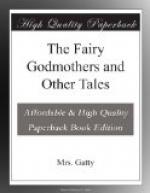“What am I to say?”
“First, you must say, ‘Our Father—’”
“Father’s dead,” interrupted the boy;
“Ah, but I do not mean that father,” answered Theodore; “and how do you know even that that father is dead?”
“The woman said so. One day she told me Father and Mother were both dead, and there was nobody left to love me, so I must mind her.”
“The woman was wrong,” cried Theodore compassionately. “You have another Father, who never dies, and who loves you always!—”
A knock at the door interrupted Theodore’s lesson on the Love of God.
“It’s about time the poor thing was put to bed,” suggested the housekeeper, looking in. “I dare say he’s tired.”
“I dare say he is,” said Theodore mechanically. “Good night, little boy. What used they to call you?”
“Reuben.”
“Good night, little Reuben.” And he was taken away.
You have another Father who never dies and who loves you always! founded like an echo through the room. Theodore arose and looked around, but there was no one there. He resumed his feat, and wondered how he had got involved in teaching the beggar boy religion. He lamented his awkwardness and unfitness for the talk; but still he thought he had done right. As to his last assertion, how else could he make the child comprehend God at all? Besides, how cruel it would be to infect him with his own miserable convictions. They would come time enough, perhaps!
Such was the current of his thoughts. The next morning he told the old housekeeper of the boy’s ignorance and his difficulty with him, and engaged her to help him in his talk, which she readily undertook.
It is not my intention to describe the many endeavours Theodore made to impress the first great truths of Christianity upon Reuben’s mind; but I can assure you he felt all the better for them himself. How it was that he never sent the little boy to the workhouse you can guess. For the first few days he kept him to see (as he said), if the woman would come back for him. Then he wished him to stay till he and the housekeeper had sufficiently impressed him by their lessons. And then—why then—by degrees, all mention of the workhouse ceased, and better clothes were bought for him; and the housekeeper, who was one of the by-gone generation of warm-hearted old family servants, became, for her master’s sake, a perfect mother to him; and to Theodore he involuntarily proved an object of daily increasing interest, and finally, of strong personal affection.




